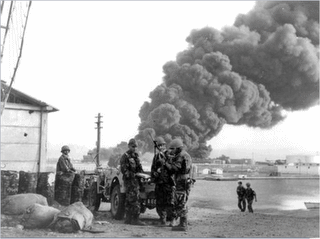|
|
|
Wars Between Britain and Egypt |
|
Anglo-Egyptian
Wars: Wars Between Britain and
Egypt Anglo-Egyptian
War
(1807)--
Seeking to replace Muhammed Ali
with a puppet ruler favorable to
British interests, Britain invaded with
nearly 5,000 troops on March 17, 1807.
British forces led by General A.
Mackenzie Fraser seized the city of
Alexandria. British forces suffered
several military defeats before
retreating and evacuating Egypt on
September 14, 1807. Greek
War of Independence
(1821-1832)--
Egypt's part in the war came about
when the Ottoman Turks requested
Egyptian aid in fighting the rebellious
Greeks. The Pasha of Egypt, Muhammad
Ali, sent his son Ibrahim to Greece
with a powerful Egyptian army. The
British, French, and Russians
intervened to save the Greeks,
defeating a combined Turko-Egyptian
fleet at the Battle of Navarino in
1827. French troops expelled the
Egyptian land forces. The Egyptian
portion of the war lasted from
1825-1832. This war led directly to the
First Turko-Egyptian War. (see below)
See also: Greco-Turkish
Wars Urabi
Revolt/British Conquest of Egypt
(1881-1882)--
Muslim rebels opposed to Turkish,
Western, and Christian influence in
Egypt (Britain and France had gained a
large degree of control due to the Suez
Canal project), rebelled on February 1,
1881 in Alexandria. On July 11, 1882,
in response to a massacre of Christians
in Alexandria, the British fleet
bombarded Alexandria, followed up by
the landing of 25,000 troops at
Ismailia. In the Battle of Tel
al-Kebir, the British defeated Urabi's
army. From this point on, Britain
retained an army in the countryand
effectively controlled Egypt, which
remained technically an Ottoman (yet
recognized as independent in all but
name), vassal. Anglo-Egyptian
War of 1951-1952
(1951-1952)--Egyptian
guerrillas, aided by the governement of
Egypt, carried out a campaign against
British forces stationed at the Suez
Canal and against other British and
Western symbols and targets. On January
25, 1952, British troops retaliated
against Egypt by attacking an Egyptian
police station, killing 50 and wounding
100. The conflict ended with a change
in the Egyptian government and the
eventual withdrawal of British troops.
This conflict led to Britain's
involvment in the 1956
Anglo-French-Israeli invasion of Egypt
in 1956. (see below) Suez/Sinai
War
(1956)--
Since the end of the First War with
Israel, Egypt encouraged Palestinian
raids against the Israelis from Gaza
and Sinai. Israel made plans with
Britain and France to attack Egypt. On
October 29, 1956, Israeli troops
invaded Egypt's Sinai Peninsula and
quickly overcame opposition as they
raced for Suez. The next day, Britain
and France, following suit, in response
to Egypt's nationalization of the Suez
Canal, and on October 31, Egypt was
attacked and invaded by the military
forces of Britain and France. President
Eisenhower of the United States
pressured Britain, France and Israel
into agreeing to a cease-fire and
eventual withdrawal from Egypt.
Militarily, Egypt was defeated by teh
invading allies, but Nasser claimed a
political and moral victory as British,
French, and Israeli forces were forced
to leave Egypt by the Great
Powers. 1.
Kohn, George C. Dictionary
of
Wars.
New York: Facts On File
Publications. 1999. 2.
Dupuy, R. Ernest and Trevor N. Dupey.
The
Harper Encyclopedia of Military
History: From 3500 B.C. to the
Present "The
History Guy" is a Registered Trademark. Contact
the webmaster |
